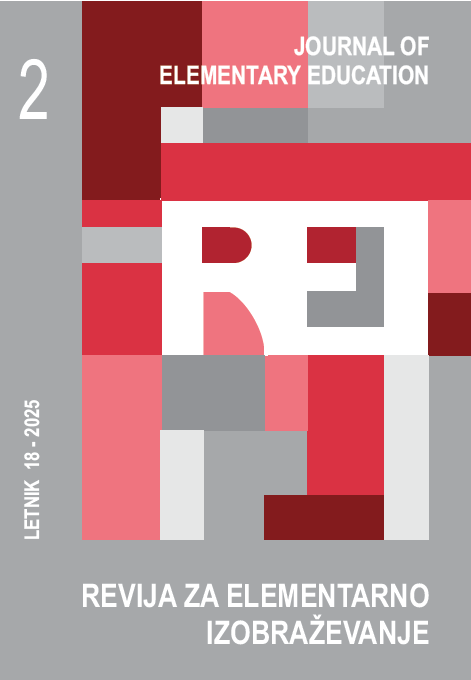Umetniški portfelji v začetnem izobraževanju vzgojiteljev predšolskih otrok kot sredstvo pridobivanja strokovnih kompetenc in reflektivne prakse
DOI:
https://doi.org/10.18690/rei.4921Ključne besede:
refleksija, likovno izobraževanje, portfelji, vzgojitelj predšolskih otrok, strokovne kompetenc.Povzetek
V raziskavi smo preučevali umetniške portfelje študentov drugega letnika dodiplomskega študija zgodnjega in predšolskega izobraževanja na Pedagoški fakulteti v Zagrebu ter njihovo refleksijo o lastnih umetniških delih. Cilj je bil ugotoviti, kako študenti doživljajo, reflektirajo in interpretirajo proces svojega ustvarjalnega dela. Z refleksijo študenti pridobivajo globlje razumevanje likovnega izražanja ter izpopolnjujejo sposobnost načrtovanja in vrednotenja likovnih dejavnosti za izvajanje v prihodnjem delu z otroki. Rezultati kažejo, da študenti, katerih refleksije o lastnih umetniških delih v portfeljih so podrobnejše, izkazujejo višjo raven samozavedanja, ustvarjalnosti in pedagoških kompetenc.
Prenosi
Literatura
Barrett, H. C. (2007). Researching electronic portfolios and learner engagement: The reflect initiative. Journal of Adolescent & Adult Literacy, 50(6), 436–449.
Bhika, R., Francis, A., and Miller, D. (2013). Faculty professional development: Advancing integrative social pedagogy using eportfolio. International Journal of ePortfolio, 3(2), 117–133.
Collins, M. A., and Amabile, T. M. (1999). Motivation and creativity. In R. J. Sternberg (Ed.), Handbook of Creativity (pp. 297–312). Cambridge: Cambridge University Press.
Creswell, J. W., and Plano Clark, V. L. (2017). Designing and Conducting Mixed Methods Research (3rd ed.). SAGE Publications.
Csikszentmihalyi, M. (1990). Flow: The Psychology of Optimal Experience. New York: Harper & Row.
Day, S. P., Webster, C., and Killen, A. (2022). Exploring initial teacher education student teachers’ beliefs about reflective practice using a modified reflective practice questionnaire. Reflective Practice, 23(4), 437–451.
Denee, R., Lindsay, G., and Probine, S. (2024). Visual Arts Self-Efficacy: Impacts and Supports for Early Childhood Teachers. Early Childhood Education Journal, 52, 1035–1045.
Doren, M., and Millington, A. (2019). A Pedagogy for Reflective Practice: Art and Design Thinking Made Visible Using an Online Learning Portfolio. International Journal of ePortfolio, 9(2), 75–86.
Eraut, M. (2003). Transfer of knowledge between education and the workplace. In H. P. A., Boshuizen, W. M. G. Jochems, M. Eraut, and W.H. Gijselaers (Eds.), Expertise Development: The transition between school and work, (pp. 52–73). Open Universiteit Nederland.
Feldman, D. H. (2003). A developmental, evolutionary perspective on giftedness. In J. H. Borland (Ed.), Rethinking Gifted Education, (pp. 9–33). NY: Teachers College Press.
Garvis, S., and Riek, R. (2010). Improving generalist teacher education in the arts. The International Journal of the Arts in Society, 5(3), 159–167.
Gibbons, M., and Borders, L. D. (2010). The Importance of Practical Experience in Teacher Education Programs. Journal of Education and Practice, 1(2), 12–23.
Herzog, J., Bačlija Sušić, B., and Županić Benić, M. (2018). Samoprocjena profesionalnih kompetencija studenata ranoga i predškolskog odgoja i obrazovanja u provođenju likovnih i glazbenih aktivnosti s djecom. Nova prisutnost: časopis za intelektualna i duhovna pitanja, 16(3), 579–592.
Iezaki, M. and Novotná, M. (2022). Reconciling the Other: Travelling objects & collaborative teaching. Journal of Elementary Education. 15(1), 1–16.
Johnson, R. B., and Onwuegbuzie, A. J. (2004). Mixed methods research: A research paradigm whose time has come. Educational Researcher, 33(7), 14–26.
Lindsay, G. (2021). Visual arts pedagogy in early childhood contexts: The baggage of self-efficacy beliefs, pedagogical knowledge and limited pre-service training. Australasian Journal of Early Childhood, 46(1), 80-92.
Machost, H., and Stains, M. (2023). Reflective practices in education: A primer for practitioners. CBE—Life Sciences Education, 22(2), es2.
Marzano, R. J. (2006). Classroom Assessment and Grading That Work. Minnesota: Association for Supervision and Curriculum Development.
Mayring, P. (2002). Qualitative content analysis – Research instrument or mode of interpretation? In M. Kiegelmann (Ed.), The Role of the Researcher in Qualitative Psychology (pp. 139–148). Tübingen: Verlag Ingeborg Huber.
Mayring, P. (2022). Qualitative Content Analysis: A step by step guide. NY: Sage.
Matijević, M., Bilić, V., and Opić, S. (2016). Pedagogija za učitelje i nastavnike. Zagreb: Školska knjiga.
McArdle, F. (2012). New maps of learning for quality art education: What pre-service teachers should learn and be able to do. Australian Educational Researcher, 39(1), 91-106.
Mejovšek, M. (2008). Metode znanstvenog istraživanja u društvenim i humanističkim znanostima. Jastrebarsko: Naklada slap.
Moon, J. A. (2013). The Handbook of Reflective and Experiential Learning: Theory and Practice. London: Routledge.
Nacionalni kurikulum za rani i predškolski odgoj i obrazovanje (2015). Ministartvo znanosti i obrazovanja.https://mzom.gov.hr/UserDocsImages/dokumenti/Obrazovanje/Predskolski/Nacionalni%20kurikulum%20za%20rani%20i%20predskolski%20odgoj%20i%20obrazovanje%20NN%2005-2015.pdf
Novotná, M. (2025). Neznámkovat, reflektovat! [Reflect but not assess! Portfolio in Art Education]. Univerzita Karlova, Pedagogická fakulta.
Probine, S. (2016). ‘Choosing the good things’: Reconceptualising and reopening discourses surrounding visual arts pedagogies in early childhood education. International Art in Early Childhood Research Journal, 5(1), 1–11.
Richards, R. D., and Terreni, L. (2022). Intentionally supporting and extending young children’s learning about and through the visual arts: Suggestions and strategies for early childhood education teachers. Curriculum Matters, 18, 88-106.
Runco, M. A., and Acar, S. (2012). Divergent Thinking as an Indicator of Creative Potential. Creativity Research Journal, 24(1), 66–75.
Schön, D. (1987). Educating the Reflective Practitioner: Toward a new design for teaching and learning in the professions. San Francisco: Jossey-Bass.
Sternberg, R. J. (1999). Handbook of Creativity. Cambridge: Cambridge University Press.
Šagud, M. (2006). Odgajitelj kao refleksivni praktičar. Petrinja: Visoka škola u Petrinji.
Visković, A., and Višnjić Jevtić, A. (2019). Je li važnije putovati ili stići? Prijelazi djece rane i predškolske dobi iz obitelji u odgojno-obrazovne institucije. Zagreb: Alfa.
Zupančič, T. (2020). The creative artistic portfolio and reporting by art education students on their student teaching. Journal of Elementary Education, 13(1), 19–40.
Županić Benić, M. (2019). The role of previous art experiences in students’ self-reflections after conducting visual arts activities in early childhood and preschool education. In M. Županić Benić, O. Holz, and M. Michielsen (Eds.), Requirements and Approaches for Contemporary Teacher Training (pp. 251–263).
Prenosi
Objavljeno
Številka
Rubrika
Licenca
Avtorske pravice (c) 2025 Marijana Županić Benić

To delo je licencirano pod Creative Commons Priznanje avtorstva 4.0 mednarodno licenco.
